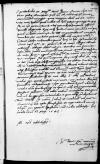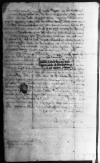List #2647
Ioannes DANTISCUS do Sigmund von HERBERSTEINCracow (Kraków), 1543-05-23
Regest polski:
Dantyszek, otrzymawszy od Herbersteina jego "[poetycki] pomnik", opisuje mu w zamian swój wstręt do życia, który wynika ze świadomości, że w tak trudnych i niebezpiecznych czasach rozum i siły człowieka nic nie znaczą. Pokłada nadzieję w bożym miłosierdziu. Żałuje, że z powodu choroby nie był na uczcie u biskupa płockiego [Samuela Maciejowskiego], gdzie mógłby swobodnie porozmawiać z Herbersteinem, i że brak mu też sił, by go odwiedzić. Rozumie, że liczne obowiązki uniemożliwiają Herbersteinowi wizytę u niego. Życzy Herbersteinowi szczęśliwej drogi i prosi, by Herberstein przypomniał o nim królowi Ferdynandowi jako o wiernym słudze.
Rękopiśmienne podstawy źródłowe:
Publikacje:
| ||||||
Tekst + aparat krytyczny + komentarz Zwykły tekst Tekst + komentarz Tekst + aparat krytyczny Ekscerpty dotyczące podróży Dantyszka
Illustri libero baroni, domino
Spectabilis et Magnifice Domine baro, amice observandissime.
Non potui committere, cum mihi Magnificentia Vestra virtutum suarum monumentum[1] misisset, quin vicissim darem ad Magnificentiam Vestram vitae meae taedium[2], quod nullus non habere potest, quisquis ea, quae se in iis gravissimis atque periculosis temporibus offerunt, exacte dispiciat. Quae neque humana ratio, prudentia vel quicquid in homine virium est, si Dei misericordia non accesserit, avertere seu mutare poterit. Ille nostri misereatur. Ceterum doleo vehementer, quod 1543-05-22⌊heri1543-05-22⌋ in hoc splendido convivio apud
Ex lecto
Magnificentiae Vestrae addictissimus


 ONB, Cod. 13.597, f. 41v
ONB, Cod. 13.597, f. 41v